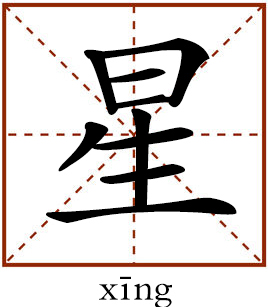Star

This character generally refers to a “star or constellation.” When used as an adjective, it means “to be dispersed.”
迢迢牵牛星
tiáo tiáo qiān niú xīng
Tiao tiao means “far far away.” Qianniu xing is the “Cowherd” star, better known in the West as Altair.
This is the first line of a poem from the famous Nineteen Old Poems, also known as Gushi Shijiushou. It is an anthology of 19 poems probably collected during the Han Dynasty. Its authorship is anonymous.
This poem depicts how a couple misses each other after being forced apart. “Far, far away resides the Cowherd Star,/ Fair, fair the Weaver Maiden Star./ Slim and soft are her tender hands,/ Click and clack sounds the loom that stands./ She stops and drops the shuttle time and again./ Shedding tears like pouring rain./ Clear and shallow is the Milky Way,/ That keeps them miles and miles away./ Surge and surge the waters from north to south,/ She loves and loves but has to shut her mouth” (trans. Wang Rongpei). The tale of Niulang (Cowherd) and Zhinü (Weaver Girl), one of the most famous love stories in China, was derived from ancient astronomical observations of the Cowherd Star and the Weaver Maiden Star, known in the West as Altair and Vega. Zhinü, a daughter of the Queen Mother in heaven, falls in love with a mortal named Niulang and they get married. However, the Queen Mother becomes furious about their marriage and creates a river (the Milky Way) to separate the couple, only allowing them to meet once a year on the 7th day of the 7th lunar month.
Starting with the personified description of Altair and Vega, the author seems to be wondering how Zhinü can bear the grief of being separated from her lover. This poem features the usage of repetition, such as tiao tiao (far, far away) and jiao jiao (fair, fair), giving the poem a beautiful rhythm and a romantic tone. Some believe that this poem, though depicting the life of a sad fairy, is also expressing how a woman on earth might suffer from tragedy in relationships. The form of this poem is gushi, or old-style poetry, an important poetic form of Classical Chinese poetry that heavily influenced later poetry. One of the characteristics of the Nineteen Old Poems is a “tone of brooding melancholy,” and this poem is no exception.
edited by REN GUANHONG
